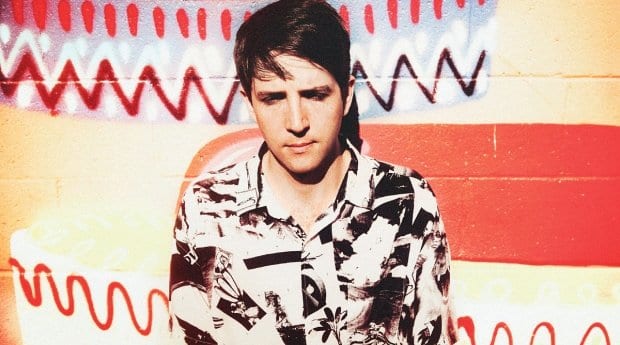Owen Pallett’s lyric video for the single “On a Path,” from his album In Conflict, due out Tues, May 27.
Steve Kado
Owen Pallett is en route from Los Angeles to Palm Springs ahead of Arcade Fire’s headlining set on the second weekend of the Coachella Festival.
The 34-year-old Toronto-bred, Montreal-based violinist is part of the Grammy-winning group’s Reflektor tour and is also pulling double duty doing interviews to promote his fourth album, In Conflict, which comes out in May. In this case, that means unpacking his issues around craziness and gender with a reporter during the hour-and-three-quarter car ride. “This is getting a little bit heavy for me. Why are you asking me heavy questions?” he protests. “It’s a funny record! It’s full of jokes!”
In Conflict is Pallett’s most direct album in terms of lyrical sentiment. Whereas the songs on 2010’s Heartland were couched in an epic, homoerotic narrative about a hunky religious zealot named Lewis who engages in a series of dialogues with his omnipotent creator (Pallett), this one does not hang on a fantastical parable.
Pallett has been working on the album for the past four years between jobs that have included arranging string parts for pop star Taylor Swift, composing for the National Ballet of Canada and scoring film soundtracks for directors M Blash and Spike Jonze.
Earlier this year, the score he and Arcade Fire’s Will Butler composed for Jonze’s Her received an Academy Award nomination and, although they didn’t win, the pair was invited to an Academy-organized dinner in Los Angeles with legendary composers and songwriters John Williams, Randy Newman, Thomas Newman and Burt Bacharach.
“Burt Bacharach and I bonded over Montreal because he went to McGill for a period and I had been to his last concert there. He’s just about the most charming man you could ever imagine,” Pallett says. “It was the best night I’ve had this year so far.”
The next milestone on his schedule is the release of In Conflict, an album that draws upon his thoughts on love and the human condition and his knack for crafting frenetic, intertwining orchestral and synth arpeggios.
The songs are personal and pointed. The opening track, “I Am Not Afraid,” uses gender-neutral pronouns as a statement of support for people caught up in confusion; “The Passions” tackles age gaps in sex with a wink to Morrissey-esque melodrama; and on “The Secret Seven” he belts out his phone number after warning listeners, “It don’t get better.”
He describes that song as an alternate take on American sex columnist Dan Savage’s campaign against homophobic bullying.
“If the record has a message, it’s kind of the message,” Pallett explains. “I felt as if the It Gets Better campaign did not speak to me of my experience. I have not found any links in my life between my own issues of craziness and queerness, which seemed to be a main focal point — with statistics to back it up — of the It Gets Better campaign.
“My experience has not been one of finding my own craziness alleviated as I’ve gotten older, become financially independent, fallen in love and, you know, realized my dreams!” he continues. “That does not negate Dan Savage’s message but speaks more of my experience, which is that it does not get fucking better at all. It’s always a struggle, and that’s not necessarily a bad thing.”
Pallett has, however, found links between craziness and songwriting. That’s part of the reason he signed on to Arcade Fire’s exhaustive world tour. “I thought it would be a good way for me to reposition myself mentally,” he says of deciding to tour with the band. “I make no secret about the fact that songwriting drives me crazy. [The tour] removes the necessity of paying the bills with songwriting — at least symbolically — which has been a good move for me psychologically.”
Despite the four-year period between albums, Pallett says that making In Conflict was less stressful than making Heartland. He recruited his former Les Mouches bandmates Rob Gordon and Matt Smith to toughen up the rhythm section and give the songs more of a live feel; English musician Brian Eno contributed synths, guitars and vocals. He asked the legendary producer to collaborate after meeting him in person, but they worked together remotely.
“He worked incredibly fast and incredibly enthusiastically,” Pallett says. “He’s the best. I recommend him to everybody.”
Now that In Conflict is complete, Pallett is filling up his schedule. The Arcade Fire tour runs through August. After that, he will perform a series of solo dates in support of In Conflict. (He will play a handful of release shows in May, including a Toronto gig on May 10.)
He also recently wrote a series of articles for Slate that examine pop hits by Katy Perry, Daft Punk and Lady Gaga using music theory, and he collaborated on a 12-inch single with dance producer Caribou, aka Dan Snaith, that is going over well in clubs.
“I’m really proud of it,” Pallett says. “I love working with Dan. We’ve been working on other stuff together, but I’ll leave that for another press release.”
In Conflict will be released May 27.

 Why you can trust Xtra
Why you can trust Xtra


